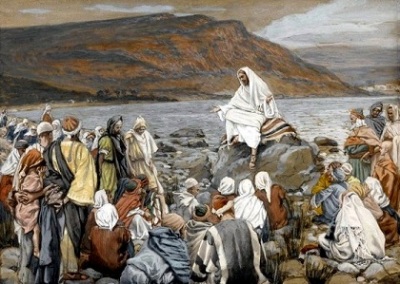 In the first letter of Saint Paul to the Corinthians, Paul gave his opinion,”about the present distress”. Evidently, there was some concern over the marital state of some of the new believers. It sounds as if there were some people who were not happy in their marriages, and others who were unhappy because they were not married. Paul gave his opinion, that it would be better for a person to remain as they are, rather than try to change things, but this is something that is not set in stone. These verses in scripture are not to be considered with the same weight as Christ’s own words.
In the first letter of Saint Paul to the Corinthians, Paul gave his opinion,”about the present distress”. Evidently, there was some concern over the marital state of some of the new believers. It sounds as if there were some people who were not happy in their marriages, and others who were unhappy because they were not married. Paul gave his opinion, that it would be better for a person to remain as they are, rather than try to change things, but this is something that is not set in stone. These verses in scripture are not to be considered with the same weight as Christ’s own words.
This is something that many people seem to have some confusion about, regarding the Apostles. The Apostles were just men. They were ordinary human beings like we are. Yes, they were holy, but they too, were only students of the Master himself. Their words do not carry quite as much weight as Christ’s words or the example of his life. Indeed, neither do the words the saints have written, or the example of their lives either, because although the saints were holy, they were not perfect people.
It is good to look up to the Apostles and the saints and listen to their holy advice and the example of their lives. But they too, had to interpret Christ’s words and live by the example of his life, the best they could, within their limited understanding of things at the time. No one understands God completely, or Jesus Christ either. This is very evident in today’s gospel.
Today’s gospel shows us that genuine faith sometimes goes against the grain of our human intelligence, or understanding. The way we look at things, is not from the same perspective of Christ’s. Jesus teaches us in his sermon on the plain that the spiritual life is a paradox. What seems good to most of us, may not actually be a good thing in God’s eyes.
Everyone wants to have a lot of money, in order to have some security for the future, and to enjoy life a little. But, the paradox is that if we have this on earth, then we will not have the same reward in eternity. It’s like, we will receive the opposite of what we experienced on earth, as our reward in heaven. This is great news for a lot of people.
Jesus used several other examples of this concept, of receiving the opposite in heaven, from what we lived during our earthly lives. Surely, the examples Christ gave us in today’s gospel are not limited to just these few examples? The poor, the hungry, the unhappy, those who are unjustly mistreated? Is it possible that the Beatitudes also apply in a much broader capacity than what we may have realized?
Perhaps those who always wished for a child, but was never able to have one, will have all the children they want to love in heaven? A person who never owned a home and slept on the streets of our cities during their lives, might be given a mansion in heaven? Maybe someone who never married, and was lonely during their lives, will be greatly loved and have much companionship in heaven? Those who suffered in miserable jobs, may be given the opportunity to do something they really love in heaven, something they maybe never had a chance to do on earth?
Just think of it. All the misery, suffering and injustices we endure in life might actually turn out to be the reason that heaven will be so beautiful. Our lives now, are not what they will be in heaven. If you think about it, people who have lived in sin, unhappiness and darkness often soar to beautiful heights of love for God and other people once they recognize the truth. This was the case with John Newton, a slave master, who wrote the famous hymn, “Amazing Grace.” He was very fortunate to undergo his conversion while he was still alive on this earth though, and he knew it.
We are also very fortunate to be able to read Christ’s words that are recorded in the gospel today, too. His words are such a blessing for those who have experienced a lot of suffering in life, and a warning for all those who have led an overly comfortable life.
We want to do everything possible to make sure our roles are not reversed in the afterlife. If you remember, Jesus also talked about this role reversal in the parable about Lazarus and the rich man, too.
It is a paradox that the good things most people value in life, can actually become a drawback to our eternal happiness.
Daily Mass Readings:
1 Corinthians 7: 25-31 / Psalm 45 / Luke 6: 20-26
